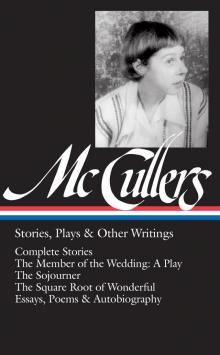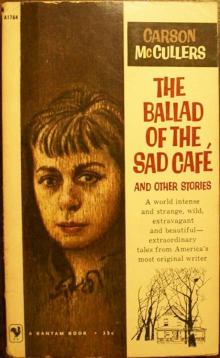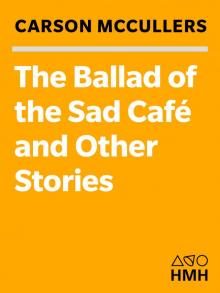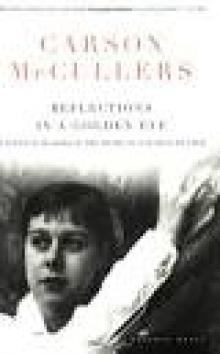- Home
- Carson McCullers
Clock Without Hands
Clock Without Hands Read online
Clock Without Hands
Carson McCullers
* * *
A MARINER BOOK
HOUGHTON MIFFLIN COMPANY
BOSTON • NEW YORK
* * *
Copyright © 1953, 1961 by Carson McCullers
Copyright © renewed 1989 by Lamar Smith, Jr.
All rights reserved
First Mariner Books edition 1998
First published in 1961 by Houghton Mifflin Company
For information about permission to reprint selections from
this book, write to Permissions, Houghton Mifflin Company,
215 Park Avenue South, New York, New York 10003.
Library of Congress Cataloging-in-Publication
Data is available.
ISBN 0-395-92973-3
Printed in the United States of America
QUM 10 9 8 7 6 5 4
Portions of this novel first appeared in Botteghe Oscure,
Harper's Bazaar, and Mademoiselle.
* * *
For Mary E. Mercer, M.D.
1
DEATH is always the same, but each man dies in his own way. For J. T. Malone it began in such a simple ordinary way that for a time he confused the end of life with the beginning of a new season. The winter of his fortieth year was an unusually cold one for the Southern town—with icy, pastel days and radiant nights. The spring came violently in middle March in that year of 1953, and Malone was lazy and peaked during those days of early blossoms and windy skies. He was a pharmacist and, diagnosing spring fever, he prescribed for himself a liver and iron tonic. Although he tired easily, he kept to his usual routine: He walked to work and his pharmacy was one of the first businesses open on the main street and he closed the store at six. He had dinner at a restaurant downtown and supper at home with his family. But his appetite was finicky and he lost weight steadily. When he changed from his winter suit to a light spring suit, the trousers hung in folds on his tall, wasted frame. His temples were shrunken so that the veins pulsed visibly when he chewed or swallowed and his Adam's apple struggled in his thin neck. But Malone saw no reason for alarm: His spring fever was unusually severe and he added to his tonic the old-fashioned course of sulphur and molasses—for when all was said and done the old remedies were the best. The thought must have solaced him for soon he felt a little better and started his annual vegetable garden. Then one day as he was compounding a prescription he swayed and fainted. He visited the doctor after this and there followed some tests at the City Hospital. Still he was not much worried; he had spring fever and the weakness of that complaint, and on a warm day he had fainted—a common, even natural thing. Malone had never considered his own death except in some twilight, unreckoned future, or in terms of life insurance. He was an ordinary, simple man and his own death was a phenomenon.
Dr. Kenneth Hayden was a good customer and a friend who had his office on the floor above the pharmacy, and the day the reports were due on the tests Malone went upstairs at two o'clock. Once he was alone with the doctor he felt an undefinable menace. The doctor did not look directly at him so that his pale, familiar face seemed somehow eyeless. His voice as he greeted Malone was strangely formal. He sat silent at his desk and handled a paper knife, gazing intently at it as he passed it from hand to hand. The strange silence warned Malone and when he could stand it no longer he blurted:
"The reports came in—am I all right?"
The doctor avoided Malone's blue and anxious gaze, then uneasily his eyes passed to the open window and fixed there. "We have checked carefully and there seems to be something unusual in the blood chemistry," the doctor said finally in a soft and dragging voice.
A fly buzzed in the sterile, dreary room and there was the lingering smell of ether. Malone was now certain something serious was wrong and, unable to bear the silence or the doctor's unnatural voice, he began to chatter against the truth. "I felt all along you would find a touch of anemia. You know I was once a med student and I wondered if my blood count was not too low."
Dr. Hayden looked at the paper knife he was handling on the desk. His right eyelid twitched. "In that case we can talk it over medically." His voice lowered and he hurried the next words. "The red blood cells have a count of only 2.15 million so we have an intercurrent anemia. But that is not the important factor. The white blood cells are abnormally increased—the count is 208,000." The doctor paused and touched his twitching eyelid. "You probably understand what that means."
Malone did not understand. Shock had bewildered him and the room seemed suddenly cold. He understood only that something strange and terrible was happening to him in the cold and swaying room. He was mesmerized by the paper knife that the doctor turned in his stubby, scrubbed fingers. A long dormant memory stirred so that he was aware of something shameful that had been forgotten, although the memory itself was still unclear. So he suffered a parallel distress—the fear and tension of the doctor's words and the mysterious and unremembered shame. The doctor's hands were white and hairy and Malone could not bear to watch them fooling with the knife, yet his attention was mysteriously compelled.
"I can't quite remember," he said helplessly. "It's been a long time and I didn't graduate from medical school."
The doctor put aside the knife and handed him a thermometer. "If you will just hold this underneath the tongue—" He glanced at his watch and walked over to the window where he stood looking out with his hands clasped behind him and his feet placed well apart.
"The slide shows a pathological increase in the white blood cells and intercurrent anemia. There is a preponderance of leucocytes of a juvenile character. In short—" The doctor paused, reclasped his hands and for a moment stood on tiptoe. "The long and short of it is, we have here a case of leukemia." Turning suddenly, he removed the thermometer and read it rapidly.
Malone sat taut and waiting, one leg wrapped around the other and his Adam's apple struggling in his frail throat. He said, "I felt a little feverish, but I kept thinking it was just spring fever."
"I'd like to examine you. If you will please take off your clothes and lie down a moment on the treatment table—"
Malone lay on the table, gaunt and pallid in his nakedness and ashamed.
"The spleen is much enlarged. Have you been troubled with any lumps or swellings?"
"No," he said. "I'm trying to think what I know about leukemia. I remember a little girl in the newspapers and the parents had her Christmas in September because she was expected soon to die." Malone stared desperately at a crack in the plaster ceiling. From an adjacent office a child was crying and the voice, half strangled with terror and protest, seemed not to come from a distance, but to be part of his own agony when he asked: "Am I going to die with this—leukemia?"
The answer was plain to Malone although the doctor did not speak. From the next room the child gave a long, raw shriek that lasted almost a full minute. When the examination was over, Malone sat trembling on the edge of the table, repulsed by his own weakness and distress. His narrow feet with the side calluses were particularly loathsome to him and he put on his gray socks first. The doctor was washing his hands at the corner washbasin and for some reason this offended Malone. He dressed and returned to the chair by the desk. As he sat stroking his scant, coarse hair, his long upper lip set carefully against the tremulous lower one, his eyes febrile and terrified, Malone had already the meek and neuter look of an incurable.
The doctor had resumed his motions with the paper knife, and again Malone was fascinated and obscurely distressed; the movements of the hand and knife were a part of illness and a part of some mysterious and half-remembered shame. He swallowed and steadied his voice to speak.
"Well, how long do you give me, Doctor?"
/> For the first time the doctor met his gaze and looked at him steadily for some moments. Then his eyes passed on to the photograph of his wife and two small boys that faced him on his desk. "We are both family men and if I were in your shoes, I know I would want the truth. I would get my affairs in order."
Malone could scarcely speak, but when the words came they were loud and rasping: "How long?"
The buzzing of a fly and the sound of traffic from the street seemed to accent the silence and the tension of the dreary room. "I think we might count on a year or fifteen months—it's difficult to estimate exactly." The doctor's white hands were covered with long black strands of hair and they fiddled ceaselessly with the ivory knife, and although the sight was somehow terrible to Malone, he could not take his attention away. He began to talk rapidly.
"It's a peculiar thing. Until this winter I had always carried plain, straight life insurance. But this winter I had it converted to the sort of policy that gives you retirement pay—you've noticed the ads in the magazines. Beginning at sixty-five you draw two hundred dollars a month all the rest of your life. It's funny to think of it now." After a broken laugh, he added, "The company will have to convert back to the way it was before—just plain life insurance. Metropolitan is a good company and I've carried life insurance for nearly twenty years—dropping a little during the depression and redeeming it when I was able. The ads for the retirement plan always pictured this middle-aged couple in a sunny climate—maybe Florida or California. But I and my wife had a different idea. We had planned on a little place in Vermont or Maine. Living this far south all your life you get pretty tired of sun and glare—"
Suddenly the screen of words collapsed and, unprotected before his fate, Malone wept. He covered his face with his broad acid-stained hands and fought to control his sobbing breath.
The doctor looked as though for guidance at the picture of his wife and carefully patted Malone's knee. "Nothing in this day and age is hopeless. Every month science discovers a new weapon against disease. Maybe soon they will find a way to control diseased cells. And meanwhile, everything possible will be done to prolong life and make you comfortable. There is one good thing about this disease—if anything could be called good in this situation—there is not much pain involved. And we will try everything. I'd like you to check in at the City Hospital as soon as possible and we can give some transfusions and try X-rays. It might make you feel a whole lot better."
Malone had controlled himself and patted his face with his handkerchief. Then he blew on his glasses, wiped them, and put them back on. "Excuse me, I guess I'm weak and kind of unhinged. I can go to the hospital whenever you want me to."
Malone entered the hospital early the next morning and remained there for three days. The first night he was given a sedative and dreamed about Dr. Hayden's hands and the paper knife he handled at his desk. When he awoke he remembered the dormant shame that had troubled him the day before and he knew the source of the obscure distress he had felt in the doctor's office. Also he realized for the first time that Dr. Hayden was a Jew. He recalled the memory that was so painful that forgetfulness was a necessity. The memory concerned the time he had failed in medical school in his second year. It was a Northern school and there were in the class a lot of Jew grinds. They ran up the grade average so that an ordinary, average student had no fair chance. The Jew grinds had crowded J. T. Malone out of medical school and ruined his career as a doctor—so that he had to shift over to pharmacy. Across the aisle from him there had been a Jew called Levy who fiddled with a fine-blade knife and distracted him from getting the good of the class lectures. A Jew grind who made A-plus and studied in the library every night until closing time. It seemed to Malone that also his eyelid twitched occasionally. The realization that Dr. Hayden was a Jew seemed of such importance that Malone wondered how he could have ignored it for so long. Hayden was a good customer and a friend—they had worked in the same building for many years and saw each other daily. Why had he failed to notice? Maybe the doctor's given name had tricked him—Kenneth Hale. Malone said to himself he had no prejudice, but when Jews used the good old Anglo-Saxon, Southern names like that, he felt it was somehow wrong. He remembered that the Hayden children had hooked noses and he remembered once seeing the family on the steps of the synagogue on a Saturday. When Dr. Hayden came on his rounds, Malone watched him with dread—although for years he had been a friend and customer. It was not so much that Kenneth Hale Hayden was a Jew as the fact that he was living and would live on—he and his like—while J. T. Malone had an incurable disease and would die in a year or fifteen months. Malone wept sometimes when he was alone. He also slept a great deal and read a number of detective stories. When he was released from the hospital the spleen was much receded, although the white blood cells were little changed. He was unable to think about the months ahead or to imagine death.
Afterwards he was surrounded by a zone of loneliness, although his daily life was not much changed. He did not tell his wife about his trouble because of the intimacy that tragedy might have restored; the passions of marriage had long since winnowed to the preoccupations of parenthood. That year Ellen was a high school junior and Tommy was eight years old. Martha Malone was an energetic woman whose hair was turning gray—a good mother and also a contributor to the family finances. During the depression she had made cakes to order and at that time it had seemed to him right and proper. She continued the cake business after the pharmacy was out of debt and even supplied a number of drugstores with neatly wrapped sandwiches with her name printed on the band. She made good money and gave the children many advantages—and she even bought some Coca-Cola stock. Malone felt that was going too far; he was afraid it would be said that he was not a good provider and his pride was affronted. One thing he put his foot down on: he would not deliver and he forbade his children and his wife to deliver. Mrs. Malone would drive to the customer and the servant—the Malone servants were always a little too young or too old and received less than the going wage—would scramble from the automobile with the cakes or sandwiches. Malone could not understand the change that had taken place in his wife. He had married a girl in a chiffon dress who had once fainted when a mouse ran over her shoe—and mysteriously she had become a gray-haired housewife with a business of her own and even some Coca-Cola stock. He lived now in a curious vacuum surrounded by the concerns of family life—the talk of high school proms, Tommy's violin recital, and a seven-tiered wedding cake—and the daily activities swirled around him as dead leaves ring the center of a whirlpool, leaving him curiously untouched.
In spite of the weakness of his disease, Malone was restless. Often he would walk aimlessly around the streets of the town—down through the shambling, crowded slums around the cotton mill, or through the Negro sections, or the middle class streets of houses set in careful lawns. On these walks he had the bewildered look of an absent-minded person who seeks something but has already forgotten the thing that is lost. Often, without cause, he would reach out and touch some random object; he would veer from his route to touch a lamppost or place his hands against a brick wall. Then he would stand transfixed and abstracted. Again he would examine a green-leaved elm tree with morbid attention as he picked a flake of sooty bark. The lamppost, the wall, the tree would exist when he was dead and the thought was loathsome to Malone. There was a further confusion—he was unable to acknowledge the reality of approaching death, and the conflict led to a sense of ubiquitous unreality. Sometimes, and dimly, Malone felt he blundered among a world of incongruities in which there was no order or conceivable design.
Malone sought comfort in the church. When tormented by the unreality of both death and life, it helped him to know that the First Baptist Church was real enough. The largest church in town, taking up half a city block near the main street, the property on offhand reckoning was worth about two million dollars. A church like that was bound to be real. The pillars of the church were men of substance and leading citizens. Butch Henderso
n, the realtor and one of the shrewdest traders in the town, was a deacon and never missed a service from one year to the next—and was Butch Henderson a likely man to waste his time and trouble on anything that was not as real as dirt? The other deacons were of the same caliber—the president of the Nylon Spinning Mill, a railroad trustee, the owner of the leading department store—all responsible and canny men of business whose judgment was foolproof. And they believed in the church and the hereafter beyond death. Even'T. C. Wedwell, one of the founders of Coca-Cola and a multimillionaire, had left the church $500,000 for the construction of the right wing. T. C. Wedwell had the uncanny foresight to put his faith in Coca-Cola—and T. C. Wedwell had believed in the church and the hereafter to the tune of half a million dollars bequeathal. He who had never made a bad investment had so invested in eternity. Finally, Fox Clane was a member. The old Judge and former congressman—a glory to the state and the South—attended often when he was in town and blew his nose when his favorite hymns were sung. Fox Clane was a churchman and believer and Malone was willing to follow the old Judge in this as he had followed him in his politics. So Malone went faithfully to church.
One Sunday in early April Dr. Watson delivered a sermon that impressed Malone deeply. He was a folksy preacher who often made comparisons to the business world or sports. The sermon this Sunday was about the salvation that draws the bead on death. The voice rang in the vaulted church and the stained glass windows cast a rich glow on the congregation. Malone sat stiff and listening and each moment he expected some personal revelation. But, although the sermon was long, death remained a mystery, and after the first elation he felt a little cheated when he left the church. How could you draw a bead on death? It was like aiming at the sky. Malone stared up at the blue, unclouded sky until his neck felt strained. Then he hurried toward the pharmacy.

 Carson McCullers
Carson McCullers Clock Without Hands
Clock Without Hands The Ballad of the Sad Cafe: And Other Stories
The Ballad of the Sad Cafe: And Other Stories The Member of the Wedding
The Member of the Wedding Collected Stories
Collected Stories The Ballad of the Sad Cafe
The Ballad of the Sad Cafe Reflections in a Golden Eye
Reflections in a Golden Eye The Heart Is a Lonely Hunter
The Heart Is a Lonely Hunter Carson McCullers - Reflections In A Golden Eye
Carson McCullers - Reflections In A Golden Eye Collected Stories of Carson McCullers
Collected Stories of Carson McCullers